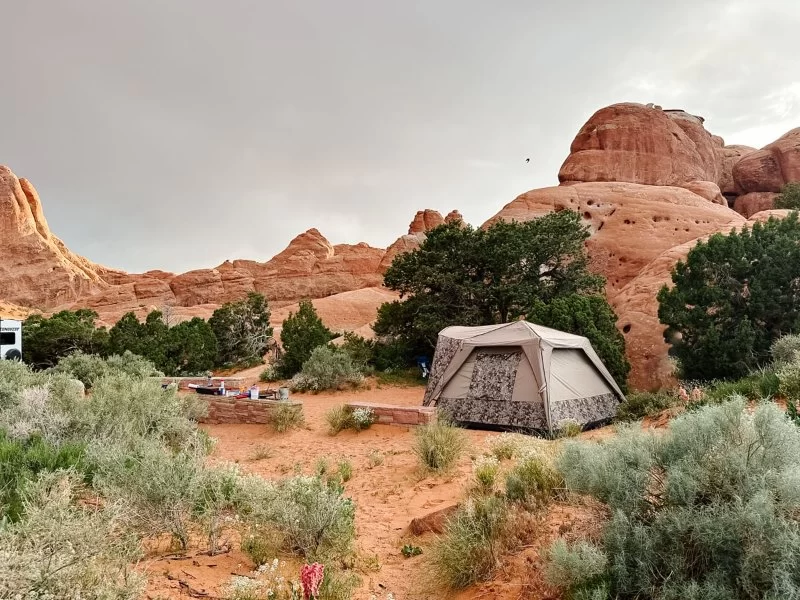Discover how to camp near sandstone arches safely and comfortably. Learn the best spots, gear tips, and expert advice for desert adventures from Pine Cliff Resort.

- 1 - Understanding the Appeal of Camping Near Sandstone Arches
- 2 - Preparing for the Desert Environment
- 3 - Choosing the Right Campsite for Comfort and Safety
- 4 - Essential Gear and Supplies for Desert Camping
- 5 - Real-Life Camping Story: A Weekend Under the Arches
- 6 - Respecting Nature and Local Guidelines
- 7 - Expert Advice and Recommendations from Pine Cliff Resort
Understanding the Appeal of Camping Near Sandstone Arches
For many outdoor enthusiasts, the allure of camping near sandstone arches lies in their quiet grandeur and raw natural beauty. These massive geological formations, shaped by centuries of wind and water erosion, glow with vibrant red and orange hues at sunrise and sunset. Learning how to camp near sandstone arches means embracing an experience that feels both otherworldly and deeply grounding. The desert’s vast silence has a meditative quality—one that reminds campers of nature’s ancient artistry.
In Utah, particularly around Moab and Arches National Park, visitors find some of the most stunning sandstone landscapes in North America. Here, nights are filled with brilliant starlight, and days reveal breathtaking hikes through narrow canyons and sculpted rock corridors. For those seeking both solitude and adventure, it’s an experience that balances peace with exploration.
Preparing for the Desert Environment
Understanding the terrain and climate
Camping near sandstone arches means adapting to the desert’s extremes. Daytime temperatures can soar past 100°F (38°C), while nights can drop near freezing. The key to comfort lies in preparation—light, breathable clothing during the day and warm layers after sunset.
Hydration and sun protection
Always carry more water than you think you’ll need. Dehydration is a serious risk in arid environments. Wide-brimmed hats, sunscreen, and polarized sunglasses are essential. It’s also wise to plan hikes early in the morning or late afternoon to avoid peak heat hours.
Wildlife awareness
Though deserts appear barren, they’re teeming with life. Keep an eye out for lizards, jackrabbits, and occasional desert foxes. Avoid leaving food out overnight—it attracts insects and small animals that could damage your gear.
Choosing the Right Campsite for Comfort and Safety
Proximity to natural formations
When deciding how to camp near sandstone arches, consider the proximity of your campsite to hiking trails and iconic formations. Staying closer to main access points like Devil’s Garden or Sand Dune Arch in Arches National Park makes early-morning exploration easier.
Legal and sustainable camping areas
Always check local regulations before setting up camp. Some areas require permits or restrict overnight stays to designated sites. Dispersed camping is allowed in certain Bureau of Land Management (BLM) zones but requires adherence to “Leave No Trace” ethics. For a comfortable and compliant stay, Pine Cliff Resort provides guidance on the best nearby camping options, including both rustic and serviced sites.
Essential Gear and Supplies for Desert Camping
1. Shelter built for the elements
Desert winds can be strong, so choose a low-profile tent with secure stakes. A reflective tarp helps reduce interior heat and offers extra shade.
2. Proper sleeping setup
A lightweight sleeping bag rated for warm temperatures and a breathable sleeping pad are must-haves. Nights can still get chilly—pack an extra blanket for comfort.
3. Food and storage solutions
Bring non-perishable meals and store them in airtight containers to prevent wildlife intrusion. For longer trips, small coolers with dry ice can keep essentials fresh.
4. Lighting and navigation
LED lanterns and headlamps are critical in the desert’s complete darkness. GPS devices or offline maps help you navigate safely if cellular coverage drops.
Many of these items, tested and approved by desert adventurers, can be found through Pine Cliff Resort’s outdoor gear recommendations, ensuring your experience is safe, efficient, and comfortable.
Real-Life Camping Story: A Weekend Under the Arches
Last spring, two friends from Denver decided to camp just outside Arches National Park. They set up their tent near the Fiery Furnace viewpoint, arriving in time to catch the sun melting over the sandstone horizon. The air turned crisp as stars filled the sky. They woke before dawn to hike to Delicate Arch, finding themselves alone with nature’s masterpiece. Their takeaway? “It’s not just the view—it’s the silence between the echoes of your footsteps.”
Stories like theirs remind us why knowing how to camp near sandstone arches is about more than logistics. It’s about connecting with landscapes that feel timeless, leaving every traveler humbled and inspired.
Respecting Nature and Local Guidelines
Follow “Leave No Trace” principles
Preserving fragile desert ecosystems is a shared responsibility. Always pack out your trash, stay on marked trails, and avoid touching delicate formations. Sandstone, though sturdy-looking, can erode easily under human contact.
Fires and safety rules
Check fire restrictions before lighting campfires. In many desert regions, wood fires are prohibited during dry seasons. Use portable stoves for cooking instead of open flames to minimize risk.
Respect sacred sites
Some sandstone arches and nearby canyons hold cultural or spiritual significance to Indigenous communities. Treat these spaces with respect and curiosity, not intrusion.
Expert Advice and Recommendations from Pine Cliff Resort
According to outdoor experts at Pine Cliff Resort, mastering how to camp near sandstone arches is all about preparation and respect. They emphasize that the best camping experiences blend self-sufficiency with environmental mindfulness. Pine Cliff Resort offers curated trip-planning assistance, gear suggestions, and insights into the most scenic—and sustainable—campsites near Utah’s red rock country.
For travelers who crave authenticity without sacrificing comfort, Pine Cliff Resort connects visitors to eco-friendly accommodations and guided tours that preserve the integrity of these iconic landscapes. Whether you’re a first-time camper or a seasoned explorer, their expertise ensures your next desert adventure is unforgettable, responsible, and beautifully human.
The River Bluff Cabins
23700 E Cobbs Corner Rd, Tahlequah, OK 74464, USA
Visit Location PageFlatwoods KOA Journey
350 Days Dr, Sutton, WV 26601, USA
Visit Location Page